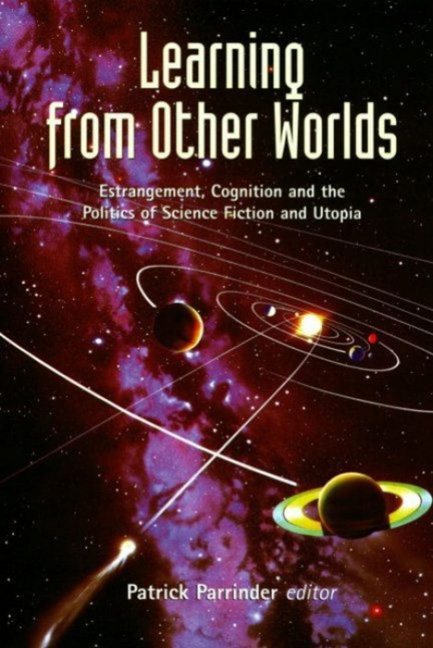Book contents
- Frontmatter
- Contents
- Acknowledgements
- Contributors
- Introduction: Learning from Other Worlds
- Part I Science Fiction and Utopia: Theory and Politics
- Part II Science Fiction in its Social, Cultural and Philosophical Contexts
- Afterword: With Sober, Estranged Eyes
- Darko Suvin: Checklist of Printed Items that Concern Science Fiction (with Utopian Fiction or Utopianism, and a Few Bordering Items)
- Bibliography
- Index
Introduction: Learning from Other Worlds
- Frontmatter
- Contents
- Acknowledgements
- Contributors
- Introduction: Learning from Other Worlds
- Part I Science Fiction and Utopia: Theory and Politics
- Part II Science Fiction in its Social, Cultural and Philosophical Contexts
- Afterword: With Sober, Estranged Eyes
- Darko Suvin: Checklist of Printed Items that Concern Science Fiction (with Utopian Fiction or Utopianism, and a Few Bordering Items)
- Bibliography
- Index
Summary
‘Discover science fiction and fantasy … We hope you enjoy this taster of a new world of reading’, coaxes a sixteen-page pull-out supplement in a recent London newspaper. Inside the supplement is a ‘Timeline’ beginning with More's Utopia, and a series of author profiles culminating in a full-page feature on ‘Mars specialist and writer Kim Stanley Robinson’. The three hundred words on Robinson focus on his ‘attempt to rehabilitate the term utopia’, his ‘egalitarian beliefs’ and his ‘idealistic life’ on a commune in rural California. Science fiction's ability to transport us to other worlds, and to draw improving lessons from them, could not be more clearly stated.
Looking more closely at this piece of advertising hype, we can detect many of the tensions and contradictions surrounding the contemporary SF phenomenon. Neither book clubs marketing the literary tradition nor record clubs marketing classical music find it necessary to strike quite this note of earnest edification in order to shift their products. There is the appeal to nerdishness—‘Get into science fiction and fantasy at W. H. Smith’, exhorts a major bookselling chain—but also the presentation of science fiction as a source of collective enlightenment and an area of knowledge, as in the prospectus of a university course. SF is both something we can ‘get into’ and, by implication, something we can or should be able to build up credits in. But it is, too, a field manifestly insecure, chronically given to overselling itself, and at once proudly incorporated in and curiously peripheral to today's culture industries. The institution of science-fiction studies has become an essential part of the genre's brand image, since SF still craves recognition and wants, above all, to be taken seriously.
Clearly, this was not always so. SF is much older than science-fiction studies. The latter's institutional life goes back no more than thirty years, though now it can boast its full quota of learned societies, journals, reference tools, annual conferences and awards for scholarly achievement. Science- fiction and utopian texts, including media texts, have become a familiar presence in the classroom. But with maturity have come diversification and a certain amount of self-questioning.
- Type
- Chapter
- Information
- Learning from Other WorldsEstrangement, Cognition, and the Politics of Science Fiction and Utopia, pp. 1 - 16Publisher: Liverpool University PressPrint publication year: 2000

